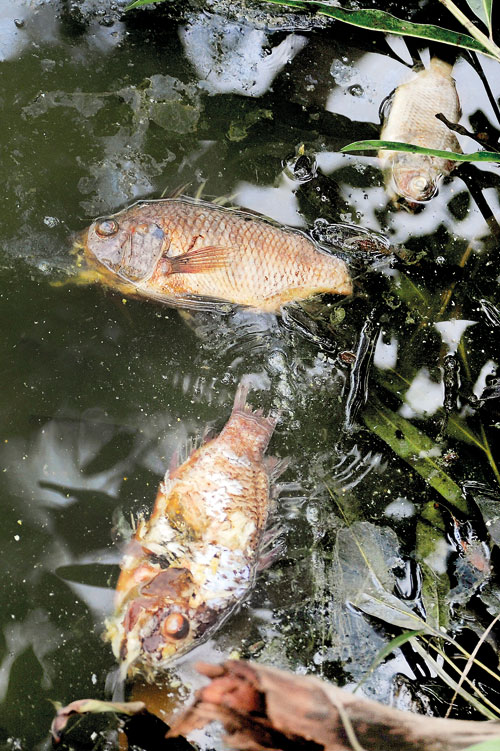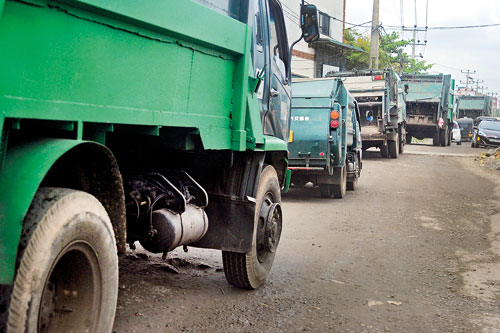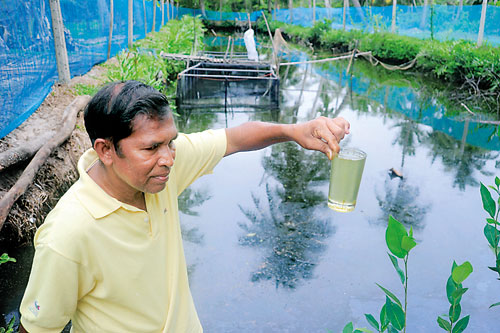News
Muthurajawela becoming environmental wasteland
View(s):
Dead fish
Thousands of fish farmed for consumption have been found dead at Bopitiya, Muthurajawela after heavy rains and the flooding contaminated the farms with waste from large scale piggeries, factories, and the recently dumped garbage. The people who ran the fish farms say the fish were dead within days when dark oily water contaminated their tanks.
The Sunday Times journalists witnessed the dead and blackened fish that floated on the surface of the water.
One fish farmer, Sarath Saparamadu, estimated his losses at Rs 150,000. He is also the treasurer of the Pamunugama Jala Jeewi Wagakaruwange Sangamaya.
He explained that the fish farmers specialised in thilapia, which they sell to hotels. “I was hoping to collect the catch within two months, but lost everything. Usually I collect over 20 metric tonnes,’’ he said.
The villagers in the area said that Muthurajawela can no longer be called a marsh because of the farms, steel factories, and garbage dump sites.
Mr Saparamadu said that the public health inspector and Grama Sevaka had only visited his residence at Madawatta, Muthurajawela once. The official did not even collect water samples.
Fish farmer, Rukman Chandrasena, said he had once witnessed the deaths of fish earlier, when waste from a large scale pig farm contaminated the water. He had complained to the PHI, the Grama Sevaka, and the Pamunugama Police at the time, but it was futile.
Once again, he complained of the damage, a week ago, he said. But no one is taking responsibility and there is no compensation.
He said that most fish farmers use water from the Hamilton Canal and other small waterways which are connected to the Muthurajawela lagoon. He said the fish in the canal have disappeared.
“Our tanks fill up with contaminated water during high tide and flush out. In my seven tanks, 15,000 fish are under threat. Already three tanks have been affected,’’ he said.
After many complaints, the PHI and the Grama Sevaka visited the area but nothing was done.
Meanwhile, the president of the Pamunugama Jala Jeewi Wagakaruwange Sangamaya, N.T.A Perera, said that he lost between 12,000 and 20,000 fish.
He said the fingerlings died quickly. Only one tank out of four holding fingerlings remained unaffected.
Three fish farmers in Bopitiya, including himself, were affected, while 22 members of the group, operating in other areas, escaped the damage.
“Owners of the pig farm release waste into the water during the rainy season while factories also pump toxic waste into the water,” he said.
Anil Lankapura Jayamaha, the president of the Organisation for Protecting Muthurajawela Sanctuary, said he had predicted such incidents following garbage dumping in Muthurajawela.
The Bopitiya Police, Govijana Seva Centre, and the Wild Life Department are ignoring the environmental degradation, he said.
Mr Jayamaha said that the people also filed a fundamental rights case against the destruction of the environment.
He charged that supporters of the previous lands minister and other powerful people are filling up sites illegally.
A senior official of the Wattala Divisional Secretariat, said that the government is causing massive damage to Muthurajawela by dumping garbage there.
The PHI of Bopitiya S R K Indunil Samaratunga declined to comment when contacted.
Meanwhile, the Sunday Times has learned that trucks are dumping unsegregated garbage on the Bopitiya gas plant site.
The Colombo Municipal Commissioner V K Anura claimed that only segregated garbage is dumped at Bopitiya. Meat or fish waste are not taken to the site, he said.
He said local government bodiesfrom other areas dump unsegregated garbage on the site. “Our garbage dumping is done smoothly. There are no issues regarding [our] garbage,’’ he claimed.
But Colombo Municipal Council garbage truck drivers said the garbage is not sorted.
Sometimes they are not allowed to dump garbage at Bopitiya because it had not been separated, or because it exceeded the daily limits, they said.
“Our overtime allowance is cut if we dump unsegregated garbage,” they said.
They said senior officials keep changing their plans about garbage collection.
“We used to only collect separated garbage on some days and unsegregated garbage on other days. Now people give us all the garbage, unseparated. So we are compelled to dump it (in Bopitiya),” the truck drivers said.

Trucks returning to Colombo after dumping unsegregated garbage at the site of the Bopitiya gas plant


Sarath Saparamadu: Estimates his losses at Rs 150,000. Pix by Amila Gamage

